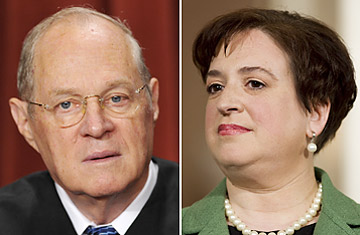
Supreme Court Justice Anthony Kennedy; Solicitor General Elena Kagan
The background guidance from the White House is that President Barack Obama nominated Solicitor General Elena Kagan to the U.S. Supreme Court because he wants someone who can stand up to the intellectually powerful Justice Antonin Scalia and Chief Justice John Roberts. What the White House isn't saying publicly is what Obama really means by that: that he picked Kagan as a one-woman intellectual envoy to Justice Anthony Kennedy.
Kennedy, as court watchers know, is the remaining swing vote, reliably conservative on most issues, but occasionally providing a 5-4 majority for the liberals. Kagan distinguished herself as Dean of Harvard Law School by making peace between long-feuding factions on the right and the left. Few think she will be able to change the positions of the most devoted conservatives, Scalia, Roberts, Justice Samuel Alito and Justice Clarence Thomas. But apparently Obama thinks she may sway Kennedy.
Is it realistic to think that Kagan can waltz into the Supreme Court and turn a lifelong conservative, even an occasionally wavering one? "That's just preposterous. That's not going to happen," says one former Kennedy clerk. "He's not going to be swayed by Kagan no matter how nice a person she is." But perhaps the White House has a more nuanced idea of how Kagan may affect the direction of the Court.
In the past Kennedy has swung to the left on gay marriage and the death penalty and on the question of executive power in counterterrorism. He has supported Roe v. Wade, but voted for limits on partial-birth abortion. He sided in favor of upholding the First Amendment right to burn the flag.
It's difficult to see Kagan bringing particular influence based on any of these issues alone. That's because Kagan is largely a blank slate, with no judicial record and a relatively short paper trail in academia. She has never been a judge — something Republicans are using in their early criticisms of her, despite the fact that decades ago it was not uncommon for Justices to come from outside the so-called judicial monastery. Tom Goldstein, a Supreme Court lawyer at Akin Gump and author of the widely read SCOTUS Blog, says she has exhibited an "extraordinarily — almost artistically — careful" avoidance of public positions on any matters she might face as a Justice. "I don't know anyone who has had a conversation with her in which she expressed a personal conviction on a question of constitutional law in the past decade," Goldstein wrote.
And even if she did have well-established positions, they'd be nothing compared to Kennedy's. "Justice Kennedy has been on the bench for 40-some years now, including his time on the Ninth Circuit," says the former clerk. "It's particularly unlikely that he's going to fall under the sway of a new judge who's never been on the court."
Kagan supporters point to the fact that she convinced some hard-line Republicans to vote for her when she was nominated to be Solicitor General, most notably Jon Kyl of Arizona, the behind-the-scenes GOP power on the Judiciary Committee. Though he's unlikely to vote for her for the Supreme Court, her ability to win him over, which she did in the course of a lengthy conversation in his office during the nomination process, counts for something.
But what's most important, her backers say, is her ability to work the process; her skill as a consensus builder, they argue, could eventually make a difference. Kennedy finds himself alone among the nine Justices on some issues, says Goldstein, and the question is which block of four can find the legal common ground to form a majority with him. "It's not infrequent that Kennedy is in a four-one-four posture and it's how you adapt to him that is what matters," Goldstein says. "It's not that she has intellectual capacities that others don't, but coalition building is a different thing, and she has an innate ability to find win-win solutions."
That hardly sounds like a recipe for dramatic change on the court, and it's not: the only real way for the Administration to substantially alter the dynamic on the court would be to replace one of the five conservative Justices. But there's a side benefit to arguing that Kagan might swing Kennedy. The left doesn't like the fact that she's a compromiser — they want a powerful liberal voice to replace John Paul Stevens. Arguing that she may bring over Kennedy gives the Administration some defense on the left flank, while they chalk up a likely victory at little cost to their political capital. And if she does end up constructing coalitions of the unwilling with Kennedy on one or two cases, the White House will take it.
